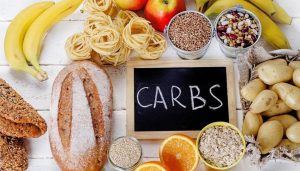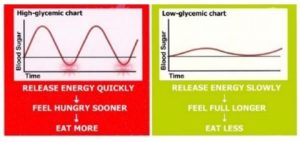Diabetes and Carbohydrates – The Basics

Carbohydrate foods play an important role in our diet. They are the best energy source for your body, especially your brain. When carbohydrates are digested, they break down to form glucose in the bloodstream. Insulin takes the glucose out of the blood and puts it into the muscles, liver and other cells in the body where it is used to provide energy. Most carbohydrate containing foods are also very good sources of fibre, vitamins and minerals which keep our body and bowels healthy.
It is important to know how much carbohydrate there is in the food you eat to understand the effects on your blood glucose levels. This can help you manage your diabetes better.
Firstly – what is a carbohydrate?
The term carbohydrate means any food that is particularly rich in the complex carbohydrate starch (such as cereals, bread, pasta, rice) or simple carbohydrates, such as sugar (found in jams, desserts, candy or even fruit).
Simple carbohydrates: The basic building block of every carbohydrate is a sugar molecule. Simple carbohydrates as mentioned above are basically made up of sugar. This means lollies, soft drinks and other sugary items, however most people do not realize that fruit and vegetables also contain carbohydrates. For example, one corn cob has the same amount of carbohydrate as a piece of bread; it is just a different type of carbohydrate. Fruits and vegetables are a better choice than lollies and cakes as they contain other important vitamins and minerals and nutrients such as fibre.
Complex carbohydrates: These are also called starches. Starches include grain products, such as bread, wheat, crackers, pasta, potato and rice. As with simple sugars, some complex carbohydrate foods are better choices than others. Refined grains, such as white flour and white rice, have been processed, which removes nutrients and fibre. But unrefined grains still contain these vitamins and minerals. Unrefined grains also are rich in fibre, which helps your digestive system work efficiently.
How do Carbohydrates affect Diabetes?
Of the three key nutrients in our food – fat, protein and carbohydrate, carbohydrate is the nutrient that will have the biggest impact on your blood glucose levels. All carbohydrates are converted to glucose within about two hours of eating, directly affecting your blood glucose levels. The effect of carbohydrate will depend on i) the amount of carbohydrate you eat and ii) the type of carbohydrate you eat.
Eating too much carbohydrate at one time can result in high blood glucose levels after meals. Eating too little carbohydrate can result in low energy levels. If you use insulin or certain types of blood glucose-lowering medications, eating too little carbohydrate or skipping a meal can cause your blood glucose levels to drop too low and lead to hypoglycaemia (a hypo).
If you eat regular meals and spread your carbohydrate foods evenly throughout the day, you will help maintain your energy levels without causing large rises in your blood glucose levels. If you take insulin or diabetes tablets, you may need to have between meal snacks. Discuss this with your health practitioner.
All carbohydrate foods are digested to produce glucose, but they do so at different rates – some slow, some fast. The glycemic index or GI is a way of describing how quickly a carbohydrate food is digested and enters the blood stream. Choosing low GI carbohydrates, the ones that produce only small fluctuations in your blood glucose and insulin levels, is one of the keys to long-term health and weight management. Keeping your blood sugar levels even keeps your mood and energy stable. It also keeps you fuller for longer!
GI uses a scale of 0 to 100 with higher values given to foods that cause the most rapid rise in blood sugar. Low GI foods have a ranking of 54 or less. Please choose low GI foods. Common foods which have a high GI include white bread, potatoes, donuts, hot chips, mars bars, soft drinks. Examples of low GI foods include traditional rolled oats, dense wholegrain breads, lentils and legumes, sweet potato, milk, yoghurt, pasta and most types of fresh fruit.

To summarise:
- Eat small meals regularly throughout the day
- Choose low GI foods
- Avoid high sugar foods, even some fruit!
- Spread your carbohydrates through the day – include plenty of protein (meat, fish and eggs and some good fats (avocado, olive oil, nuts)
If you would like more information or a personalized eating program/advice book a consultation with Kasey, our Nutritionist.
Kasey Boorman, Nutritionist
